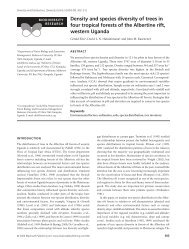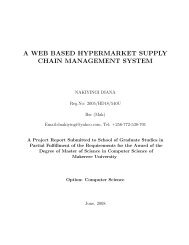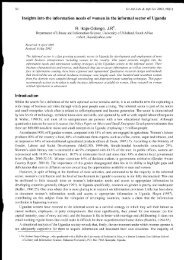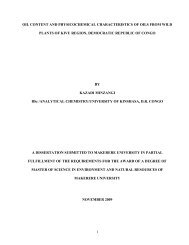THE UNIVERSITY OF LEIPZIG
THE UNIVERSITY OF LEIPZIG
THE UNIVERSITY OF LEIPZIG
You also want an ePaper? Increase the reach of your titles
YUMPU automatically turns print PDFs into web optimized ePapers that Google loves.
will play important roles. This evaluation would necessitate directing our attention to<br />
discussions concerning another branch of institutionalism, historical instituionalism.<br />
Historical Institutionalism<br />
The historical institutionalists are interested in understanding and explaining events and<br />
outcomes. Scholars working in this tradition argue that one can explain particular historical<br />
outcomes by examining the way in which political institutions had shaped or structured the<br />
political process. 219 One key concept is through upholding the path dependency concept. The<br />
path dependency concept postulates that the historical track of a given institution will result in<br />
almost inevitable occurrences. In some institutions this may be a self-perpetuating cycle:<br />
actions of one type beget further actions of this type of institutions. 220<br />
It is also imperative to make mention of the fact that the phrase path dependence is used in<br />
both fields, the economics as well as in the historical traditions of institutionalsim to mean<br />
one or two things depending on the specific circumstances. Some authors use pathdependence<br />
to mean simply "history matters" - a broad conception - whilst others use it to<br />
mean that institutions are self reinforcing. 221 It is this self-reinforcing conception, which has<br />
the most explanatory force and which the subsequent discussions in this sub-section will<br />
benefit from. The claim that "history matters" is central to understanding institutions from<br />
both a formal and informal perspective. 222 This dynamic vision of historical institutional<br />
evolution is very different from the neo-classical economics tradition, which in its simplest<br />
form assumed that only a single outcome could possibly be reached, regardless of initial<br />
conditions or transitory events. With path dependence, both the starting point and 'accidental'<br />
events can have significant effects on the ultimate outcome. Deeply embedded in the<br />
historical institutionalist literature, path dependence roots in the assumption that institutional<br />
making systems tend to be conservative, and find ways of defending existing patterns of<br />
institutions, as well as the organizations that make and deliver those institutions. 223 In<br />
Pierson’s terms there are self-reinforcing processes in institutions that make institutional<br />
configurations, and hence their policies difficult to change, once a pattern has been<br />
established. 224<br />
During the past several decades, historical institutionalism has emerged as a leading approach<br />
to institutional analysis and indeed a prominent approach within political science more<br />
219<br />
Steinmo, S and K. Thelen. 1992. Structuring Politics: Historical Institutionalism in Comparative Analysis.<br />
New York:Cambridge University Press.<br />
220<br />
Pierson, P. 2000. Increasing Returns, Path Dependence, and the Study of Politics. American Political Science<br />
Review 2:251-267.<br />
221<br />
Pierson, P. 2004. Politics in Time. American Political Science Review 87: 845-855<br />
222<br />
Weingast, B. 1996. Political Institutions: Rational Choice Perspectives. In A New Handbook of Political<br />
Science edited by H.D,Goodin, 167-190. Oxford: Oxford University Press.<br />
223<br />
Bovens, M. A, P P. Hart, and B. G. Peters. 2001. Success and Failure in Public Governance.Cheltenham:<br />
Edward Elgar.<br />
224<br />
Pierson, P. 2000. Increasing Returns, Path Dependence, and the Study of Politics.” American PoliticalScience<br />
Review 94(1): 251–66.<br />
46






